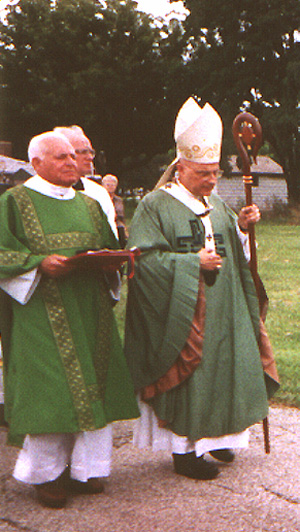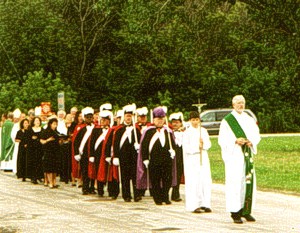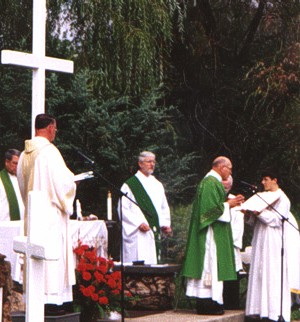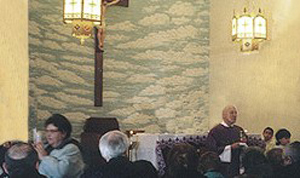Deacons
At San Rocco, we have been fortunate to have a number of deacons visit us, to help out as needed. We are especially grateful to Bob Bonta, who grew up in the neighborhood, Ray Deabel, who helped out when there was no priest assigned, Gene LaBelle, who came for the Cardinal's visit, and John Leonas, who comes from the Joliet Diocese.
Traditionally, a deacon's role is to serve as needed. He does not preside at Mass, hear confessions, or anoint the sick. While he does have a role in the liturgy, especially in singing his various parts, the Western Church has tradtionally emphasized another role for the deacon: service in the community, in one form or another.
At
Mass, the deacon can make the announcements. That could include
announcing any songs which need to be announced, the petitions of the
various litanies (such as the Kyrie-litany at the beginning, as well as
the General Intercessions, the Prayer of the Faithful) , the invitations (such as "Let us offer each other a sign of peace"),
and the community announcements at the end of Mass. The
deacon sings the litanies, especially the General
Intercessions. If he does not sing these petitions, the
priest does so. The deacon also sings the introduction to the Gospel,
proclaims the Gospel, and sings the conclusion. On special
occasions, he may use incense at various times in the celebration. He
also helps with Communion, for example, with the chalice. If there
is any need in the liturgy, the deacon can fill in as required.
He may also coordinate the details of the celebration, as appropriate.
the invitations (such as "Let us offer each other a sign of peace"),
and the community announcements at the end of Mass. The
deacon sings the litanies, especially the General
Intercessions. If he does not sing these petitions, the
priest does so. The deacon also sings the introduction to the Gospel,
proclaims the Gospel, and sings the conclusion. On special
occasions, he may use incense at various times in the celebration. He
also helps with Communion, for example, with the chalice. If there
is any need in the liturgy, the deacon can fill in as required.
He may also coordinate the details of the celebration, as appropriate.
At baptisms, weddings, funerals, Lauds, and Vespers, the deacon can sing the appropriate parts, for example, the litanies and the song in honor of the Easter candle at Vespers. If it is a Eucharist, he would take the usual diaconal parts, as on Sunday. As at the Eucharist, the deacon's first concern is the participation of the people, especially their sung participation; as needed, he can support and lead the singing of the congregation.
Outside the liturgy, deacons accomplish a myriad of tasks. They can be responsible for financial matters, provide counselling, bring Communion to the home, visit the sick, carry out evangelization, catechize children and adults, teach others, do research, work for justice, defend the needy, organize workers, combat racism, promote peace, and provide social services to the poor. Sometimes, a deacon will spend much time in one ministry, for example, in managing a shelter for the homeless or in organizing against the dealth penalty.
Such work today is often carried out apart from the local parish; it represents an outreach to the wider community. At San Rocco, we would welcome a deacon especially to sing his parts of the liturgy and to help with Communion; outside the liturgy, evangelization would be a natural priority. Hopefully, in due time, we would be blest with such a deacon, on a regular basis.
As of 2011, we have on record 775 deacons in the Archdiocese of Chicago (of whom 571 are active locally) and 531 priests who are active and not yet retired or sick. Thanks to the vocations of deacons, the number of clergy is increasing. There is no crisis.







 top
top